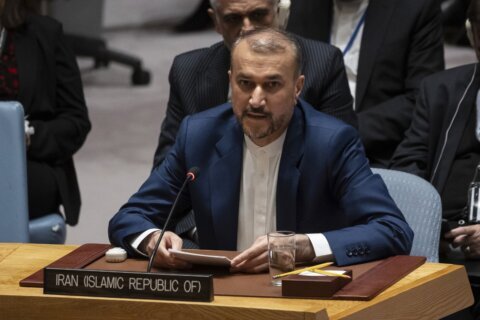JERUSALEM (AP) — The U.S. State Department has raised concerns with Jordan about the possible mistreatment of a former top official imprisoned for sedition in an alleged plot against the Western-allied monarchy involving the half-brother of King Abdullah II.
Representatives for Bassem Awadallah, who is a U.S. citizen, have said the trial lacked due process and alleged his client has endured inhumane conditions, including beatings, torture and solitary confinement. Jordan rejects the charges.
A State Department official confirmed the U.S. Embassy in Amman on Aug. 9 “expressed concerns to the government of Jordan over allegations of mistreatment and the denial of family visits.”
The official, speaking on condition of anonymity under department guidelines, said that Jordan denied the allegations. “The embassy will continue to provide all appropriate consulate assistance to Mr. Awadallah in line with our commitment to assisting U.S. citizens abroad,” the official said.
The U.S. considers Jordan a key ally and source of stability in the turbulent Middle East and rarely expresses criticism of the kingdom in public.
Awadallah, who once served as a top adviser to the king, and Sharif Hassan bin Zaid, a member of the royal family, were found guilty of sedition and incitement last month and sentenced to 15 years in prison. They are alleged to have conspired with Prince Hamzah, the king’s half-brother, and to have sought foreign assistance.
The convictions took place following a closed trial that lasted just six sessions in a military court. The court denied requests by defense lawyers to call witnesses, and prosecutors shared only purported transcripts, but not original audio recordings, from surveillance of the alleged plotters.
Michael Sullivan, a former U.S. federal prosecutor hired by Awadallah’s family in the U.S., has said the trial “violated every international standard for justice and human rights.” Sullivan is now a partner with the Ashcroft law firm.
Mark Corallo, a spokesman for the firm, said that Awadallah was physically abused in April and May. Since he was convicted in July, Awdallah has been held in solitary confinement and denied visits or phone calls with his immediate family. He said Jordanian officials also refuse to allow Awadallah to meet with Sullivan and continue to persistently interrogate him.
A Jordanian official confirmed that his government received the U.S. letter and responded by rejecting the allegations from Awadallah’s family as “unfounded, baseless and completely false.”
He said Awadallah’s treatment has been “in full compliance” with international standards for human rights, the right to a fair trial and prisoners’ rights. He also said Awadallah has been allowed to receive six visits by U.S. Embassy officials.
“At no stage was Awadallah subject to mistreatment, torture or cruel, inhuman or degrading treatment or punishment whatsoever,” said the official, who spoke on condition of anonymity because he was discussing a confidential diplomatic matter.
Awadallah and bin Zaid were swept up in a wave of arrests in April and Hamzah was placed under house arrest.
Hamzah denied the allegations in video statements released from house arrest, saying he was being silenced for speaking out against corruption and poor governance.
The royal family later said it had resolved the dispute. But Hamzah has been seen in public just once since his arrest, at a family memorial service, and remains in what the government calls the king’s care.
Hamza’s mother, Noor Al Hussein, issued a statement on Twitter Friday thanking “those who continue to call for truth and justice for Prince Hamzah, who is still imprisoned at home, and for any other innocent citizens.”
___
Akour reported from Amman, Jordan.
Copyright © 2024 The Associated Press. All rights reserved. This material may not be published, broadcast, written or redistributed.







